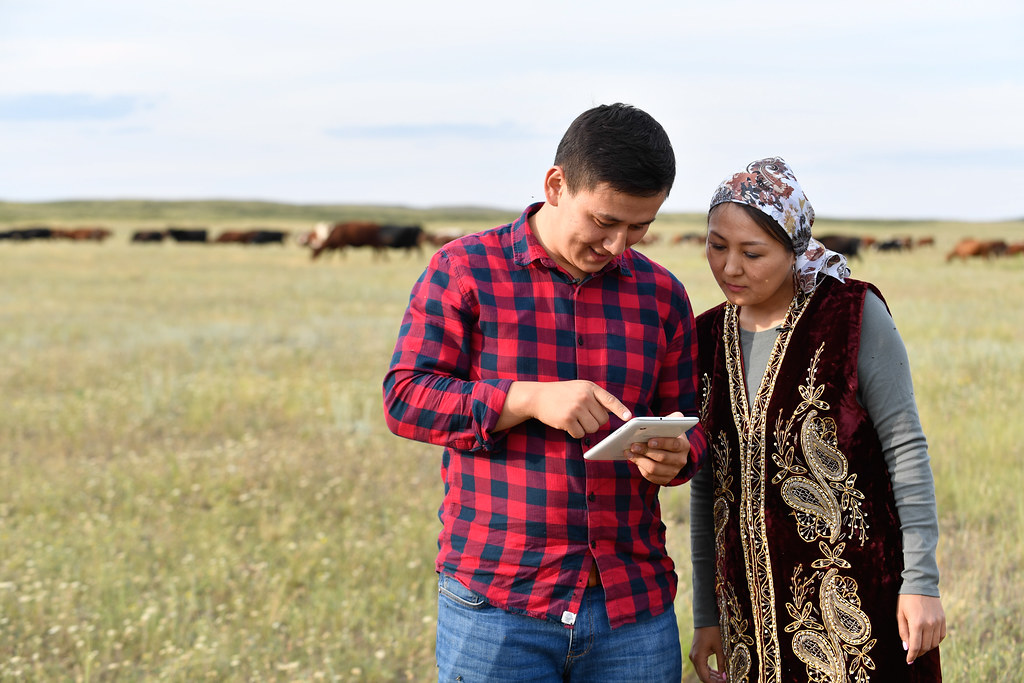Livestock industry in Central Asia looks into digital solutions to build resilience

Dairy and meat businesses in Central Asia, especially smaller ones, are being hit by multiple shocks – from the war in Ukraine, to droughts, to the lingering effects of COVID-19.
Production costs have skyrocketed, while consumers’ purchasing power has weakened, making it difficult for agribusinesses to stay afloat.
One way to help small-scale farmers and agribusinesses optimize costs and be competitive is through reliable and timely knowledge and data.
With that in mind, the European Bank for Reconstruction and Development (EBRD), the FAO Investment Centre and FAO’s Digitalization and Informatics Division partnered with livestock industry associations in Kazakhstan to create a dedicated free app. It is essentially a one-stop shop for practical knowledge – from localized market information on animal feed, veterinary pharmacies and clinics to climate-smart practices and a farmer-to-farmer forum.
“This type of information and knowledge is critical if we are to take the mission seriously to sustainably feed future generations,” said FAO Agribusiness Officer Inna Punda.
The app, Agrokomek, is based on FAO’s Digital Services Portfolio (DSP), which provides digital advisory services to rural communities, tailored to local contexts and needs, with easy access to useful data, informationand statistics that support more efficient, resilient and inclusive agrifood systems. Developing rural digital inclusion on the ground, it is part of a wider Organizational effort aiming at promoting the shift towards digitalization and modernization in agriculture, through an efficient use of digital tools for major improvements in the food and agriculture sector in the field.
The multilingual tool, already active in Kazakhstan, will next be launched in the Kyrgyz Republic and managed by national private sector industry associations in both countries.
One unique feature of the app is the animal feed balancing tool, which helps farmers optimize their production costs while increasing animal productivity.
“This new animal feed balancing tool is a direct result of our internal collaboration and can be adapted by other countries where the Digital Services Portfolio is offered,” said Dioguen Zaridze, DPS Manager at FAO’s Digitalization and Informatics Division.
“This collaboration also sheds valuable light on ways to build partnerships with local industry associations, which can serve as an operational model for the Digital Services Portfolio in the future,” he added.
Improving performance
These efforts are part of a COVID-19 responsiveness package by FAO and the EBRD – first launched in 2020 for USD 3.85 million. The package, slated to run until September 2023, is helping agribusinesses in the EBRD’s countries of operation cope with pandemic-related challenges.
“Strengthening the capacity of industry associations to deliver high quality decision-support services through digital solutions, and share good practices on food safety and sustainability issues, will help smaller agribusinesses lead public-private dialogue and become more resilient and hopefully grow,” said Nemanja Grgic, Principal Manager, EBRD Agribusiness.
The app builds on FAO’s and EBRD’s past support to Kazakhstan’s dairy industry, which has introduced digital innovations to improve the industry’s performance, growth and competitiveness in recent years.
One earlier innovation is Collect Mobile, an app that helps Kazakhstan’s dairy companies monitor the performance of their raw milk suppliers, which are scattered across the massive country, and optimize milk procurement routes.
“Collect Mobile gives milk processing companies a crystal clear understanding of the supply chain and enables them to spot efficiency losses,” said Punda. “Once they know what is wrong and where, they can access e-extension services via FAO’s Digital Services Portfolio app to resolve those bottlenecks.”
The Smart Milk portal is another innovation, providing guidance and tips on good farming practices, animal feed and food safety, from farm to table. Designed for dairy farmers, milk collectors, processors and even consumers, it features a handbook for family farms, a manual for milk collectors, posters, video tutorials and animations.
In addition to Kazakhstan and the Kyrgyz Republic, FAO and the EBRD are supporting small-scale livestock farmers in Georgia, Ukraine and Uzbekistan as part of the COVID-19 responsiveness package.
